
Alexander Heinle
Alex is a marketer at Zavvy. On this blog, he mainly shares insights gained from discussions with selected experts and from helping our customers set up and improve their onboarding or learning programs.

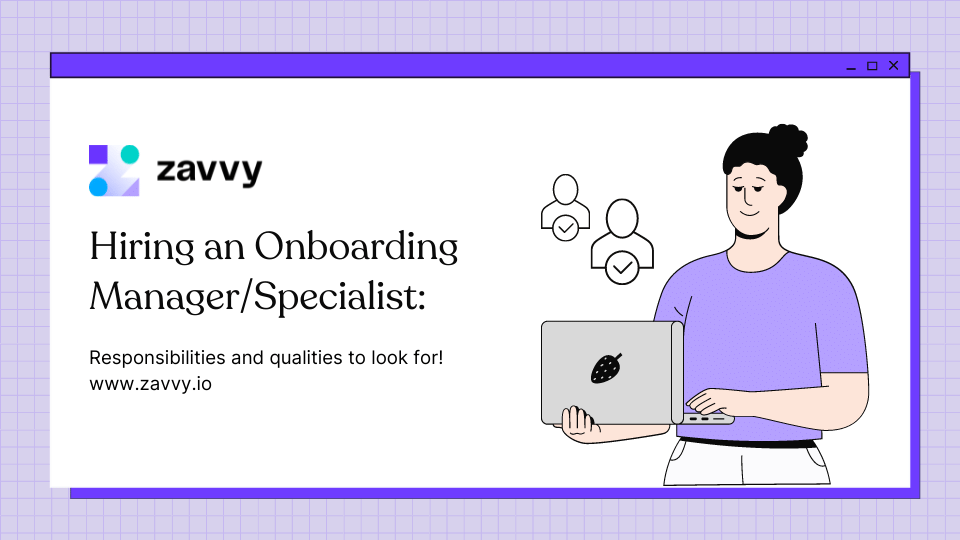
In her paper Onboarding New Employees: Maximizing Success, author Tayla Bauer identified four distinct levels of onboarding (the Four C's):
The degree to which each organization leverages the four C's of onboarding determines the effectiveness of its overall onboarding strategy. The more effective your onboarding strategy, the lower the employee turnover, the higher the productivity.
There's a catch: ensuring you leverage all the four Cs effectively is tricky.
Since the stakes are high, you need someone capable enough to do the job—someone who understands your employees' state of mind, knows how to make them feel comfortable, and can execute all tasks required for successful onboarding.
That someone is an HR onboarding manager.
How exactly can this person help your team? Let's take a closer look.
Together with our curators, we have created a library of actionable digital marketing resources. Personalized to your team's needs.
An onboarding manager, also known as an onboarding specialist, is responsible for organizing, streamlining, and overseeing employee onboarding in an organization.
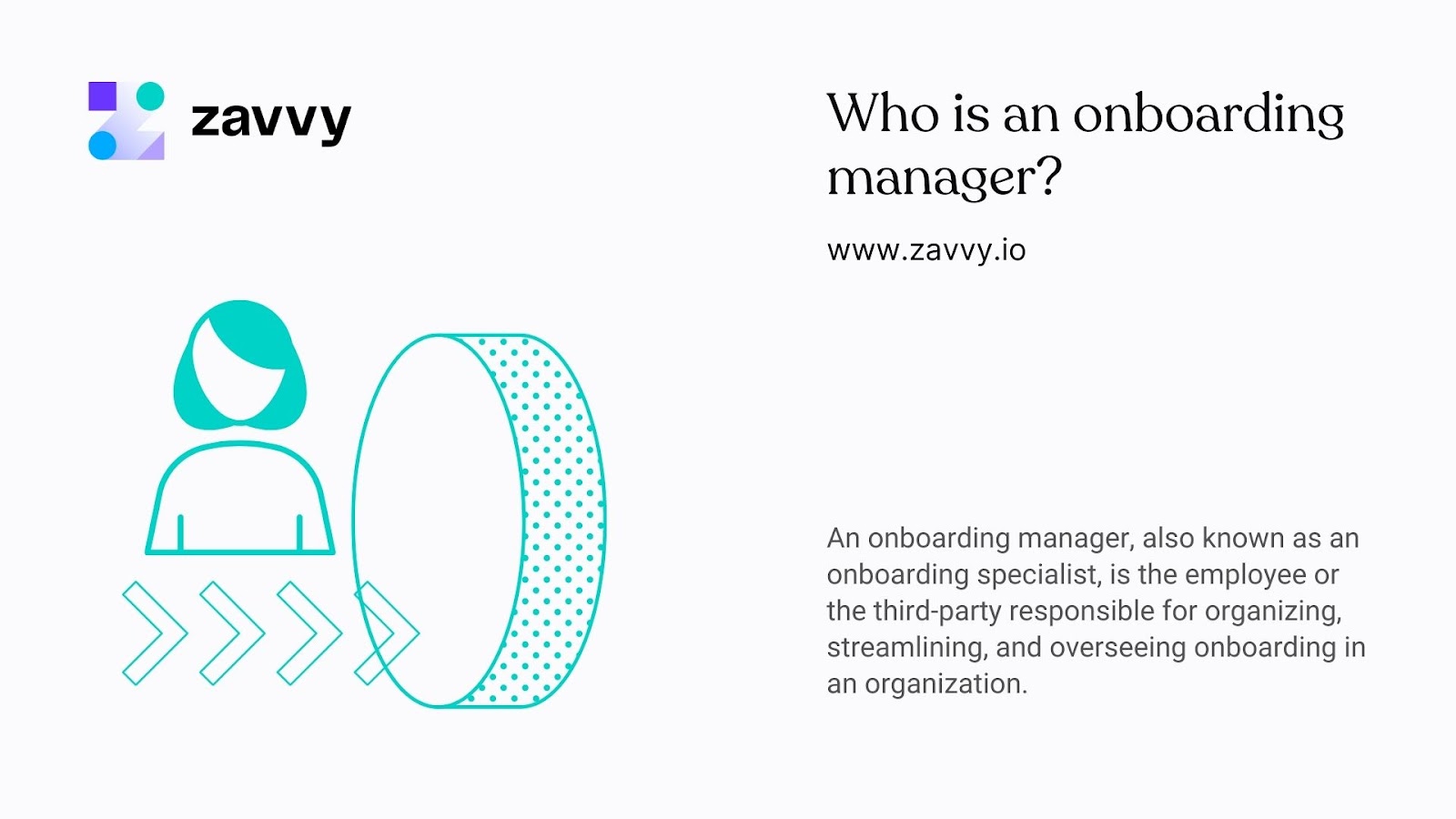
Their primary role is to make new hires feel comfortable with the company, transitioning them from a newbie to a valued part of the family.
This article will focus on the job description and role of the employee onboarding specialist. Keep reading to learn how your company can benefit from hiring an onboarding manager.
(And if you're interested in the differences to customer onboarding specialists, jump to the end of this article.)
The HR onboarding manager is fully responsible for employee onboarding, overseeing new employees, and ramping up as quickly and effectively as possible to add momentum to company goals.
At Zavvy, we believe every decent onboarding process has at least two stages: preboarding and onboarding.
Preboarding is all about sending welcome packages and scheduling a virtual meetup to familiarize new hires with their superiors. They should also have access to important account information and systems to make their first day easy and less stressful.
As for onboarding, the whole process can last over three months. It involves measuring employee performance against specific timeframes (the 30-60-90 day onboarding plan), namely, the first day, the first week, the first 30 days, the first 60 days, and the first 90 days, to make them fully productive faster.
The onboarding manager takes full responsibility for both preboarding and onboarding.
As they oversee procedures both before and after hiring new employees, the onboarding manager schedules new hires' training, creates company policies and employment documents - and helps new employees adjust to the work environment. All the while complying with applicable labor laws.
Here's what the typical job description of an onboarding specialist looks like:
The above list isn't exhaustive and covers the more critical responsibilities of an onboarding specialist. You can always change the job description to suit your company's requirements.
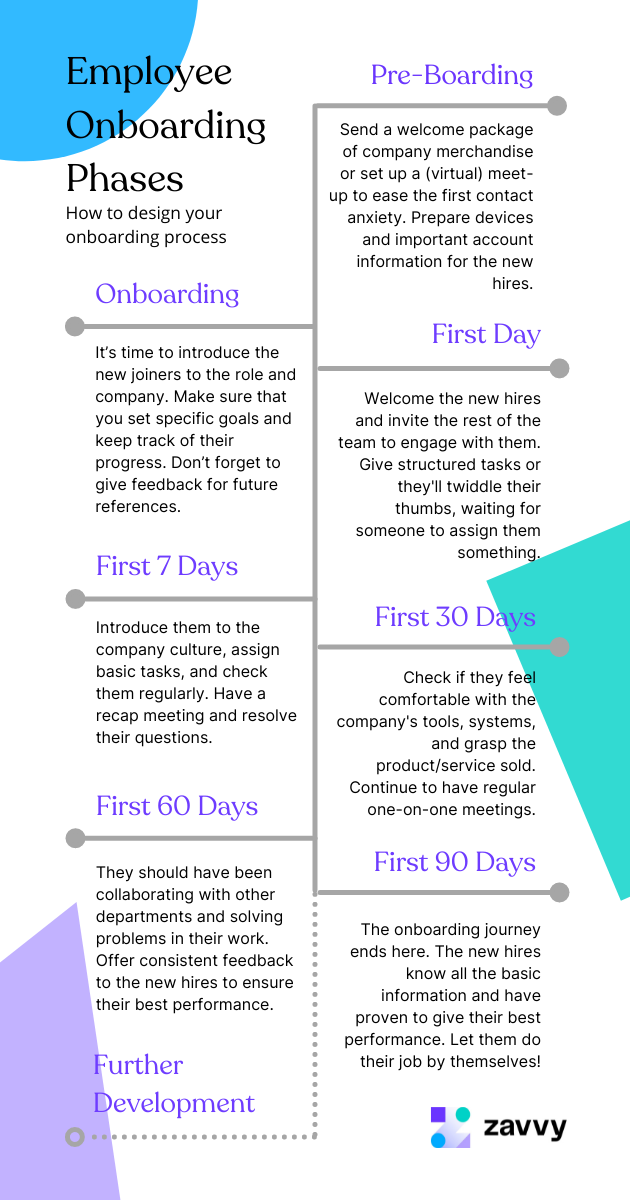
Onboarding is arguably the most crucial organizational activity because it defines how productive new employees will be in the future. It ensures your new hire isn't a half-baked employee that stalls your company's growth—or worse, stunts it.
Hiring an onboarding manager makes it more likely for your new employees to acquire the skills they need to be competent in their jobs and ensure their performance aligns with company expectations.
While all this sounds great, you're probably wondering whether getting an onboarding manager for the long term is worth it for your team. To help answer your question, we've discussed a few situations where having a dedicated onboarding manager makes sense.
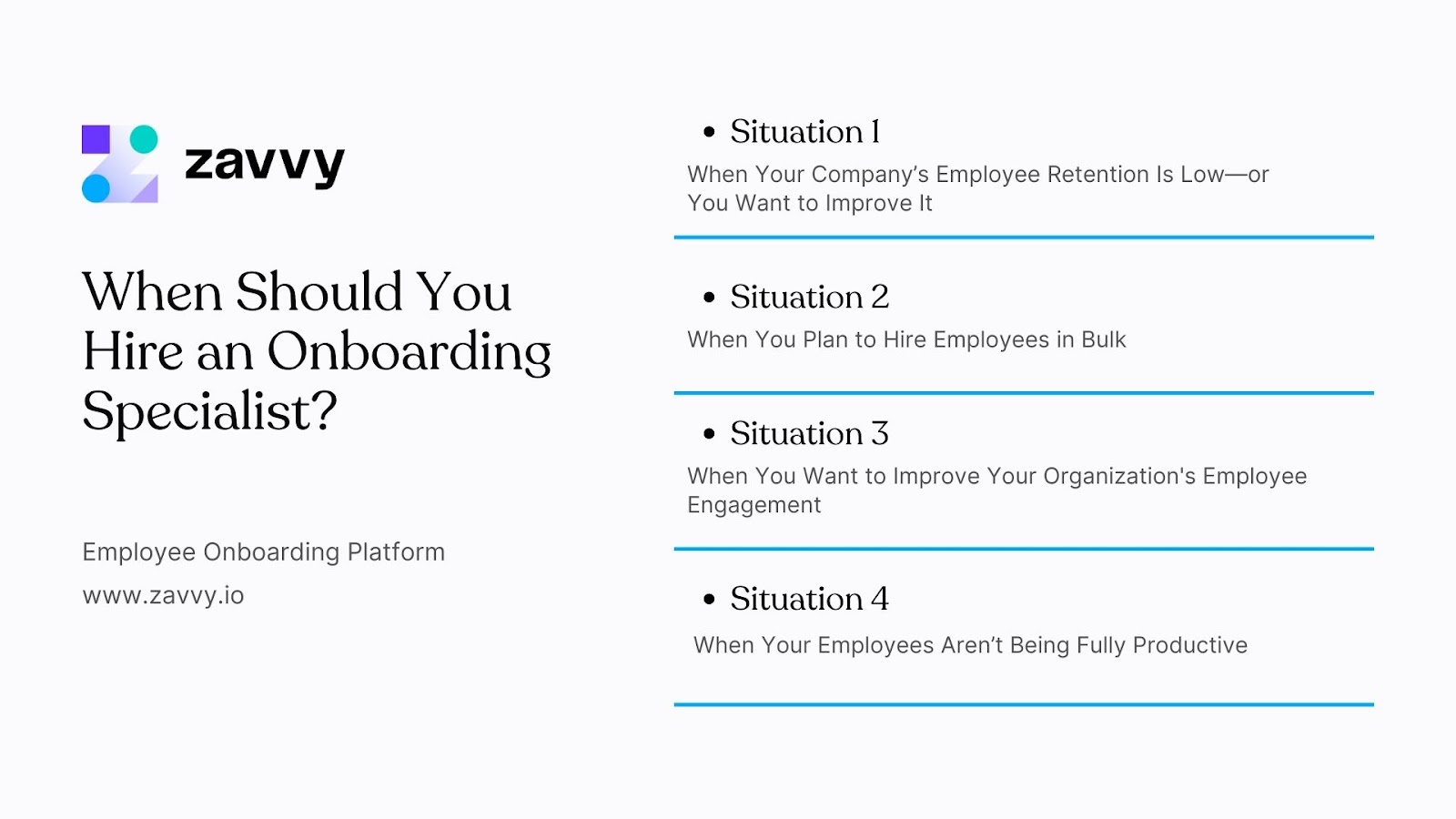
Replacing an employee is expensive.
According to SHRM, it costs a company 6 to 9 months of an employee's salary to replace them on average. So if your employee makes $80,000 per year, expect to pay 50,000-$65,000 in recruiting and training costs for a replacement.
While some turnover is normal, maximizing your employee lifetime value should be your primary goal.
Studies suggest you can improve new hire retention by 82% with a robust onboarding in place.
By hiring a dedicated onboarding manager, you can give your new employees a solid start at your organization, plus have someone to brainstorm effective employee retention strategies. In addition, they can extend a warm welcome to build off the excitement and ensure a smooth transition from a candidate to a new hire to a fully productive, long-term employee.
If you plan to hire many people soon, you can definitely benefit from having a dedicated onboarding manager in your corner. There may, in fact, be no way around it.
Once your recruiting team is growing, it's a good sign you may have to start wondering how to actually bring these people on board.
Especially in fast-growing startups, HR's core function is seen in recruitment. And hence, it's where all eyes are.
But, what happens once these people are actually starting? Our clear recommendation is to hire a dedicated person to establish decent onboarding processes before things get too messy.
An onboarding manager can help you deliver a stronger employee experience and help new hires reach maximum productivity faster. In turn, this will ensure whatever project required you to hire in bulk gets executed and completed on time, steering your company towards growth.
Also, the onboarding manager has a vested interest in employee performance, and under their guidance, new hires can align their performance with organizational expectations.
Having engaged employees in your workforce is the ultimate game-changer—one that leads to amazing things like higher productivity and profitability and lower turnover and absenteeism.
The only problem? Only 20% of employees globally are engaged at work.
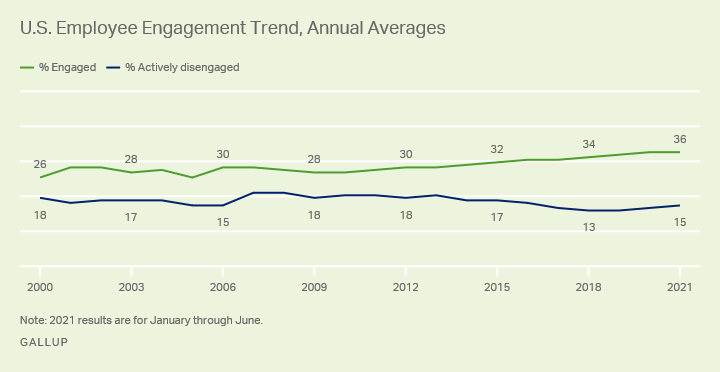
Luckily, an onboarding manager can design a fantastic employee onboarding program that helps to build employee engagement from day one. They can include activities, like learning about the company interestingly (think: lunch with a manager or the CEO), setting them up with a buddy or mentor, and listening to and implementing their feedback that makes new employees feel more connected to your organization and its mission, vision, and values.
New employees can take well over a year to be fully productive, and understandably so. They have to understand a brand-new work environment, build relationships to forge cross-functional teams, and fulfill their personal goals.
An onboarding specialist can speed up the entire process, decreasing time to proficiency and improving productivity by over 70%. Under their guidance, new hires will become acclimated to the company culture and can build better relationships with employees from the get-go.
What's more, an onboarding specialist isn't only valuable when you're bringing in new employees to your organization—they can also help existing employees improve their productivity.
How? An onboarding manager takes care of many responsibilities, including goal-setting, scheduling frequent check-ins, and overseeing employee development that informs employees what's expected of them and where they stand. They also give employees pointers to help them improve and become better at their jobs. Some companies start with hybrid roles that combine onboarding & L&D.
Hiring an onboarding manager is a serious deal. You want someone that gets the job done, is detailed, enjoys planning, and has an empathetic approach towards employees, among other things.
Below, we've compiled a list of seven qualities that can help you find an onboarding manager that is a true asset to your company.
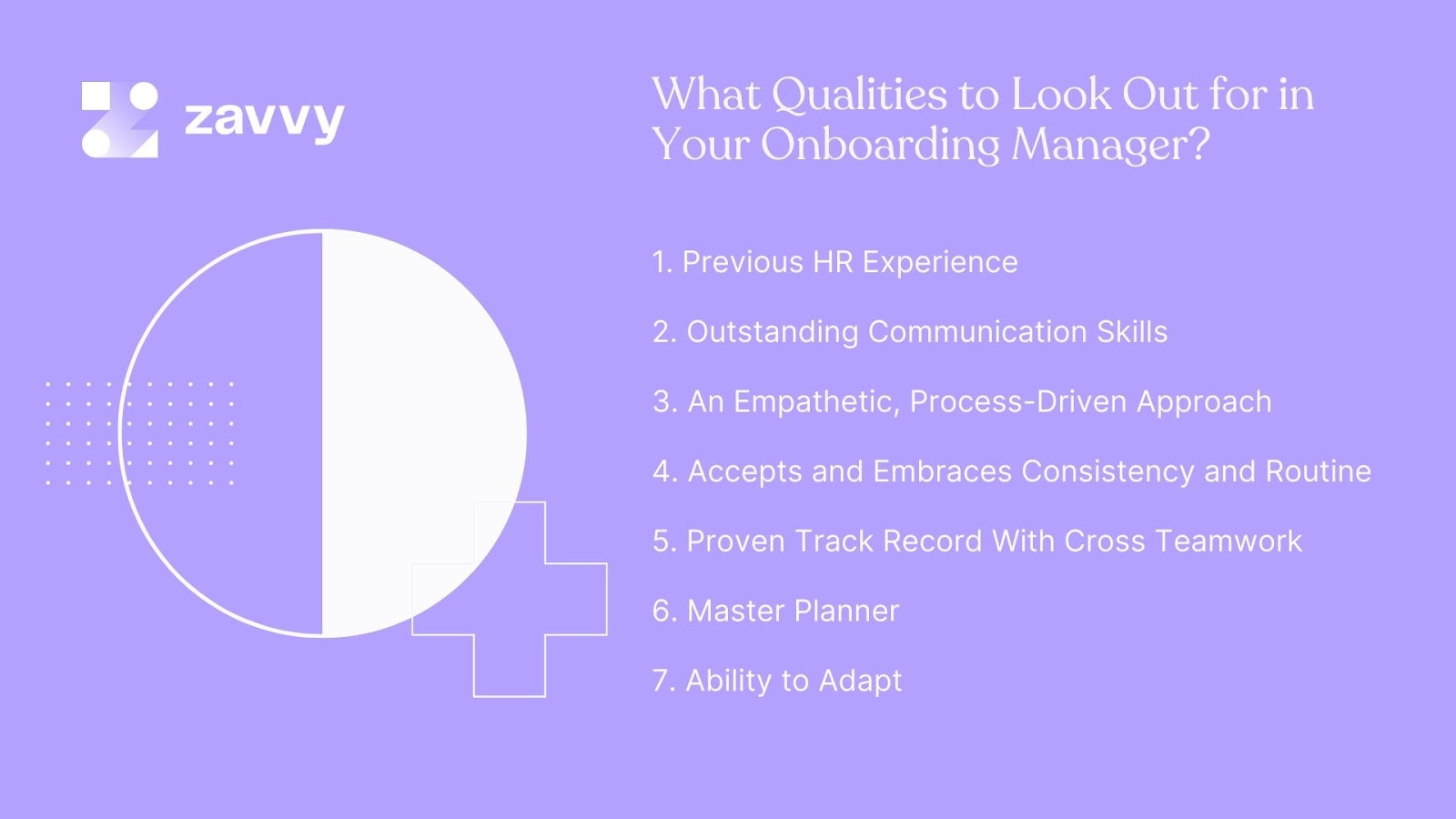
When hiring employees, your prospective onboarding manager should be well-acquainted with HR and regulatory compliance applicable to your company. That's why you'll do well with someone experienced who can understand the applicable rules and can keep up with new regulations to update your processes over time.
If you already have a strong HR team, you can work with an onboarding manager with less experience—provided they're aware of the essential tasks that must be completed when hiring new employees.
We cannot emphasize the importance of excellent written and verbal communication skills for an onboarding manager enough. Think about it: what's the point of having an onboarding manager if they cannot effectively communicate with your newly appointed employees?
Exactly.
You need someone with strong verbal communication skills as the employee training sessions and initiation processes rely heavily on effective verbal communication. In contrast, writing skills are vital to succinctly communicate company values, policies, and procedures in official documents.
A good onboarding manager needs to have the right balance between empathy and respect for the process.
If they don't have enough empathy, they may create an overly efficient process that doesn't consider employee fears and doubts, typical for individuals starting a new role. This may cause the new hires to flounder and take longer to onboard.
At the same time, if the candidate isn't process-driven, the onboarding experience won't be uniform for all employees. Some employees will have a great experience; others won't. And when the onboarding process has to be recreated from scratch every time, the overall productivity of the whole workforce takes a hit.
But if you get an onboarding manager that can find the right balance between empathy and process, you're likely to see better outcomes for your business faster.
Once onboarding has been figured out and implemented, it's about optimization.
The onboarding manager will spend most of their time checking in on previous cohorts, reminding them, maintaining the onboarding program, and looking after new employees. This can get repetitive if you don't have a smart tool to make their life easier.
You want a specialist who can build a robust onboarding process, yes. But you also want someone who can look for small iterations in the program and keep the program running long-term to ensure consistently good outcomes.
The only exception to this is when you're in hyper-growth mode, where every process will have to be rebuilt entirely after 6 to 12 months to accommodate the changing demands of the company. In this case, you need to find an onboarding manager motivated to reinvent the onboarding process and start from scratch regularly.
Typically, every department manager and executive has solid opinions on onboarding. Some believe they don't need to be involved; some will have tightly structured processes that overwhelm, sometimes even scare off, the new employees.
An onboarding manager should be able to get feedback from every team member and then build alignment around a single process.
You'll find candidates who have the skills and perseverance to do cross-teamwork, but many won't. Your best bet is to look for individuals that have completed similar initiatives in the past. It doesn't have to be about onboarding, too—it can be any project as long as it involves handling multiple teams with differing viewpoints to come up with an ideal solution.
If you find an onboarding manager who has taken on similar projects in the past, the odds are good that they can build a successful onboarding process that meets each department's requirements and that the whole workforce will follow.
Developing and maintaining the onboarding process across the company is the most critical part of an onboarding manager's job. The onboarding process impacts each department of the company significantly, where the specialist helps establish company values and oversees quick and effective onboarding for new employees.
Besides this, the specialist also performs a lot of other detailed tasks:
All these are high-impact tasks, which is why the onboarding manager doesn't have unlimited room for error, especially when you want to make a solid first impression on new employees to keep them in your company for longer.
In the highly dynamic, technology-first world we live in today, onboarding methods and principles are changing to reflect the changes in technology.
Keeping this in mind, you need an onboarding manager that can quickly adapt to change—someone who can ensure your new employees receive adequate training regardless of the technological changes and even during periods of economic and political uncertainties. The candidate should also help your "old" employees effectively use the new resources available.
If you want to develop a thriving culture of learning and excellence, you cannot compromise with your onboarding. A good onboarding manager, preferably one that meets the above criteria, can ensure every new hire goes through a polished and uniform onboarding experience, giving you highly engaged and loyal employees.
The salary of an onboarding manager varies depending on their experience, expertise, type of the company, and industry. But to give you a fair idea, the average onboarding specialist salary in the US is $43,875 annually, which comes up to $22.50 an hour.
The entry-level positions start at $35,100 per year, while the more experienced managers make as much as $63,132 per year.
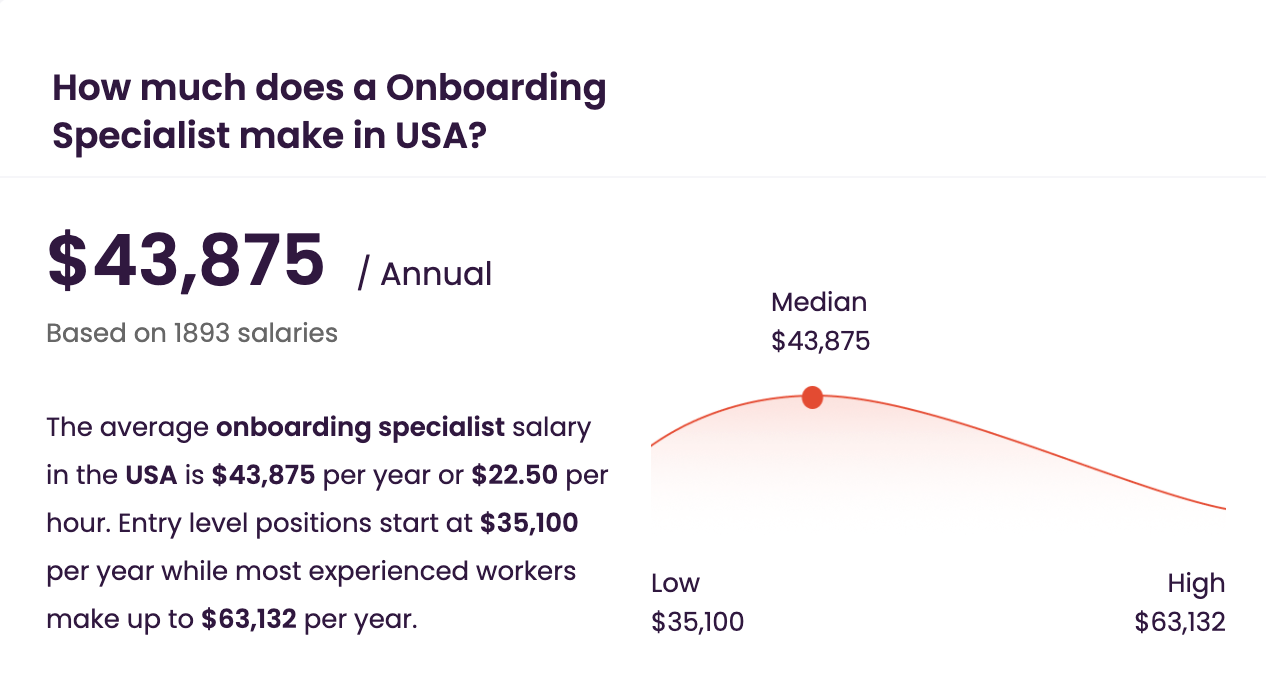
The average onboarding manager salary is £30,225 per year or £15.50 per hour in the UK. Entry-level positions start at £23,000 per year, while the more experienced workers can make up to £50,000 per year.
As always, salaries scale with employee size and vary from location to location. In general, the compensation should closely align with other People Ops roles, especially L&D.
Hiring a dedicated onboarding manager can significantly improve employee experience, which, in turn, will improve employee performance and lower employee turnover. With their experience and expertise, the specialist can design a fantastic onboarding process that helps new hires become more engaged and acclimated with the company culture and familiarizes them with company expectations to ramp up productivity faster.
Want to help your onboarding manager become even more efficient? With Zavvy, your onboarding specialist can automate repetitive manual HR tasks of their job description, which will free up their valuable time to focus on delivering an unparalleled onboarding experience. From sending out welcome emails to new hires to inviting them to bond with existing employees to scheduling follow-up meetings, they can do it all with Zavvy to foster employee performance, culture, and well-being.
Empower your onboarding manager with a world-class employee enablement platform like Zavvy. Sign up for a live demo now.
In any company, an onboarding specialist has two paths: employee onboarding and customer onboarding. Unfortunately, while these two terms sound similar, they are pretty different.
An employee onboarding specialist is a part of the HR department who helps new employees do their jobs properly. They enable the new hires to adapt to the company culture, understand its tools and systems, and get productive—as fast as possible.
The other aspect of the job is to deal with technical procedures. An onboarding specialist is also responsible for filing the hiring paperwork and communicating company policies to the new employees.
On the other hand, a customer onboarding specialist focuses on effective onboarding and guiding new users or clients to achieve their first success with the company's product or service.
Customers go to your competition when they:
Thanks to a customer onboarding specialist's efforts, these problems are minimized. As a result, customers have a smoother start at the company, where they learn how to use the product or services in a simple, effective manner, making them less likely to churn.
To put things into perspective, the onboarding manager who helps the employee become a part of the company from being a newbie is the employee onboarding specialist—and the manager who takes the customer from the initial signup to the first success is the customer onboarding specialist.
Upskill your team every week with the best contents and personalized recommendations.

In her paper Onboarding New Employees: Maximizing Success, author Tayla Bauer identified four distinct levels of onboarding (the Four C's):
The degree to which each organization leverages the four C's of onboarding determines the effectiveness of its overall onboarding strategy. The more effective your onboarding strategy, the lower the employee turnover, the higher the productivity.
There's a catch: ensuring you leverage all the four Cs effectively is tricky.
Since the stakes are high, you need someone capable enough to do the job—someone who understands your employees' state of mind, knows how to make them feel comfortable, and can execute all tasks required for successful onboarding.
That someone is an HR onboarding manager.
How exactly can this person help your team? Let's take a closer look.
Get a demo!
We'll be happy to show you around and answer all your questions.
Trusted by innovative companies



We'll be happy to show you around, answer your questions, or arrange a free trial.
Erhalten Sie eine kostenlose Demo unserer Onboarding-Software.
Vertraut von



Your Training & Development Strategy - Solved in 1 Tool.
Trusted by innovative companies



We'll be happy to show you around, answer your questions, or arrange a free trial.
Learn how Zavvy helps you drive performance, development, and engagement.
Trusted by innovative companies



We'll be happy to show you around, answer your questions, or arrange a free trial.
We'll be happy to show you around and answer all your questions.
Trusted by innovative companies



We'll be happy to show you around, answer your questions, or arrange a free trial.
Gerne zeigen wir Ihnen ganz unverbindlich unsere Plattform im Detail.
Vertraut von modernen Unternehmen



Get a demo!
We'll be happy to show you around and answer all your questions.
Trusted by innovative companies



We'll be happy to show you around, answer your questions, or arrange a free trial.
Erhalten Sie eine kostenlose Demo unserer Software für Mitarbeiterenwicklung und Training.
Moderne Unternehmen
setzen auf Zavvy


